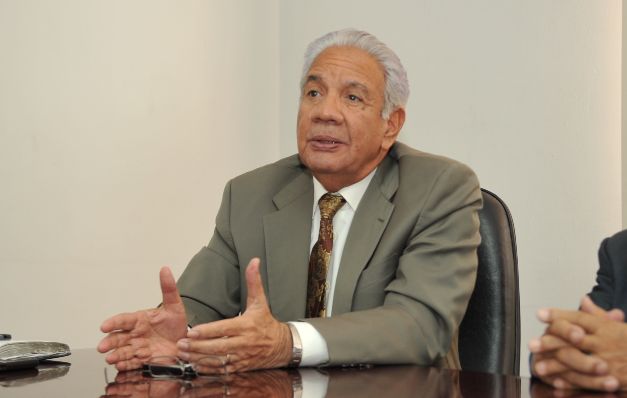Extradition process is inadmissible, says Cruz
Actualizado 2016/05/31 06:47:14
Former Atty. General Rogelio Cruz has gone on record stating that “the extradition process against Ricardo Martinelli is inadmissible”. Mr. Cruz, who forms part of the former president's legal team, was yesterday given access to legal documents that form part of the extradition process against Mr. Martinelli.

Former Atty. General Rogelio Cruz has gone on record stating that “the extradition process against Ricardo Martinelli is inadmissible”. Mr. Cruz, who forms part of the former president's legal team, was yesterday given access to legal documents that form part of the extradition process against Mr. Martinelli.
According to Mr. Cruz, the inadmissibility would stem from a fundamental procedural error on the part of Harry Diaz, the magistrate originally charged with this case. Indeed, magistrates Diaz’ decision to proceed to issue an extradition request without formulating charges would not hold under international law. Mr. Martinelli has been residing in the USA since leaving Panama in early 2015. He accuses the current government of political persecution.
Mr. Cruz went on to explain that the extradition treaty between the U.S. and Panama, underwritten in 1904, stipulates that for an extradition request to proceed, there must exist a court sentence, or, failing that, that at the very least guilty charges must have been formulated.
This is not the case as far as the phone tapping case against Mr. Martinelli goes. In fact, magistrate Diaz obviated formulating charges against the former president, and instead issued an indictment. According to Cruz, such procedural error would make the extradition request null and void under international law.'
Case against Garuz and Perez still stuck in its tracksThe case against former Security Council and National Defense secretaries Alejandro Garuz and Gustavo Perez shows no sign of progress.As a result of pleas made by their respective legal defense teams, alongside others made by security officials who have also been accused, Ernesto Perez, magistrate in charge of the case, has beenunable to set a date for a hearing.According to Roniel Ortiz, who forms part of the defense team, the pleas would concern the refusal to consider admissible some evidence presented by the defense that the prosecution has based its case on false testimony. In specific reference to a testimony by a witness nicknamed Brad, the defense has argued that they have been denied access to the evidence, on account of that he could not be located.Alejandro Perez, also part of defense team, explained that the only incriminating evidence produced was found on the computer of the security agent nicknamed around Brad. He accused the government of bribing said the agent with an overseas a diplomatic post that was not justified by his rank.And during the preliminary hearing, the judge in charge ordered that both Mr. Garuz and Mr. Perez be freed from their preventive detention. The second tribunal also confirmed the decision to free the suspects. However, Mr. Perez remains in custody, serving a six year sentence for illegal possession of firearms.
In his defense, magistrate Harry Diaz has argued that it was right and proper to proceed with an indictment without formulating charges, since Mr. Martinelli was ready subject to a judicial process under the country’s Penal Accusatory System (SPA). This view has been contradicted by Mr. Martinelli’s a legal team. According to Sydney Sitton, a member of Mr. Martinelli’s legal defense, there already exist legal precedents in which charges were formulated before an indictment could be issued. Mr. Sitton cited the example of deputy assembly member Samuel Bennett of Cambio Democratioco (CD): Mr. Bennett first received charges, was then indicted, and was finally absolved in a court of law.
Mr. Martinelli’s legal team was finally given access to the legal documents supporting the case against their client only yesterday. The extradition request was presented by magistrate Jeronimo Mejia, in place of magistrate Diaz. Upon analyzing the documents, Mr. Cruz declared that "magistrate Mejia had bent backwards to try and correct the procedural flaws magistrate Diaz had incurred". According to Mr. Cruz, magistrate Mejia attempted to divert attention from the legal inadmissibility of the case by declaring his client in contempt of court.
Since magistrate Mejia has failed to remedy the underlying errors of magistrate Diaz of, there only exist one course of action, says Mr. Cruz: "Foreign Minister Isabel de Saint Malo must reject the extradition request if she is to respect the rule of law".
Mr. Martinelli’s defense received the English version documents detailing the extradition request. 95% were copies of files put together by investigating magistrate in charge of the phone tapping case. Two more former government officials – Alejandro Garuz and Gustavo Perez, respectively former Secretary of Security Council and National Defense - are awaiting trial. Mr. Cruz explained that thanks to these documents, he and his team will be able to argue in an American Court of law why the extradition request against their client does not proceed.
Mr. Cruz also went on to explain that the foreign minister has committed herself to providing a response to the extradition request within 30 days, adding that Ms. de Saint Malo could simply throughout the case on grounds of legal vice and save the country a long, drawn out process.
The foreign minister herself recently recognized that the extradition process is going to be arduous, since the crimes for which the former president is being accused are not those encompassed by the extradition treaty that exists between the two countries. Should Ms. de Saint Malo decide to admit the case, she would have to pass it on to the embassy of Panama in Washington, DC, who would then refer it to the U.S. Dept. of State.









Para comentar debes registrarte y completar los datos generales.